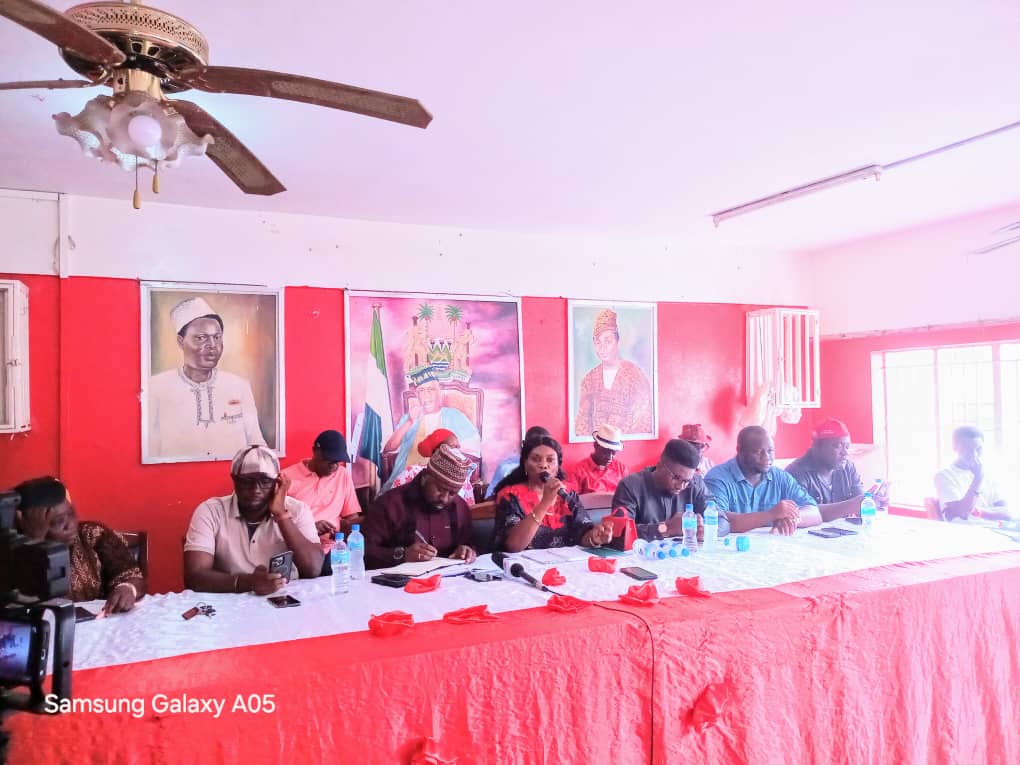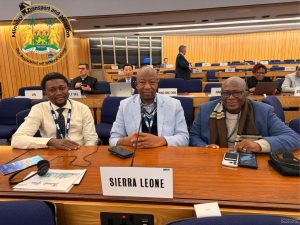Opposition MPs Critique SLPP Govt Failure to Deliver on Promises at APC Parliamentary Press Conference

In a passionate and incisive critique at the recent APC Parliamentary Monthly Press Conference, opposition Members of Parliament (MPs) sharply rebuked the ruling Sierra Leone People’s Party (SLPP) government for its failure to fulfill key promises made since taking office in 2018. Leading the charge, Hon. Ben Alpha Mansaray, the deputy spokesman for the opposition, accused the SLPP government of peddling what he described as “false hopes” to the Sierra Leonean people. He pointed out that while the SLPP had pledged growth, wealth generation, infrastructure improvements, and better educational opportunities, Sierra Leoneans are now facing escalating economic hardship instead of the promised prosperity.
A Disappointed Opposition Voices Its Concerns
Hon. Lucinda Kelli, a senior member of the opposition, further emphasised the lack of tangible progress in crucial sectors, particularly infrastructure and electricity supply. Despite the government’s ambitious promises to boost these sectors, Kelli noted that specific road projects and electricity expansion plans, which had been at the heart of SLPP’s 2018 campaign, have failed to materialize as promised. She highlighted towns such as Kenema and Moyamba, which still remain without the upgrades that were supposedly on the horizon, leaving them in a state of stagnation and missed opportunity.
The rising cost of living also emerged as a central point of concern during the press conference. Opposition MPs underscored the drastic increase in the prices of essential commodities, particularly rice and fuel. Recalling the SLPP’s bold promises during the 2018 campaign to address the “bread and butter” issue within six months, the MPs lamented that, seven years later, not only have prices skyrocketed, but the cost of basic staples like rice has more than doubled, reaching over one million leones.
Broken Promises and Unmet Expectations
In a thorough and impassioned address, Hon. Mohamed Alpha Jalloh detailed what he called a pattern of broken promises by the SLPP government. Jalloh clarified that the opposition’s critique was not based on the government’s 2023 manifesto but focused exclusively on the 2018 “New Direction” manifesto, the foundation upon which the SLPP assumed power. He noted that it would be unjust to judge a manifesto for a term that had not yet begun, especially considering that the government had not even fulfilled the promises from its first term.
Jalloh highlighted specific promises from the 2018 manifesto, quoting directly from the text. One of the most striking promises was that the SLPP would usher Sierra Leone into a transformative era characterised by unity, peace, progress, dynamism, confidence, entrepreneurship, and national happiness. He pointed to the phrase “happy nation” and starkly contrasted it with the reality that Sierra Leone remains, according to global indicators, one of the unhappiest countries in the world. Jalloh also emphasised the manifesto’s claim that Sierra Leoneans would enjoy “unlimited access to jobs, food, education, and health services,” which, in his view, remains an unfulfilled and hollow promise in the face of current economic and social challenges.
Education: A Sector of Unmet Expectations
Turning to the education sector, Hon. Jalloh outlined a litany of unfulfilled commitments. He pointed to the SLPP’s promise to build staff quarters and develop long-term housing solutions for teachers, noting that no such improvements had been made. The manifesto also pledged to create child-friendly schools with adequate recreational facilities and sanitation infrastructure, but these commitments remain largely unmet, particularly in districts like Port Loko and Kenema, where the basic infrastructure for education is still lacking.
Jalloh also criticised the government for failing to meet its promise to ensure that every administrative section would have at least one primary school, every chiefdom or ward would have a junior secondary school, and every constituency would have a senior secondary school equipped with a science lab. In his constituency, 114 in Wellington, Jalloh noted that only two schools are operational, with improvements being made primarily by local community members rather than through government action.
The issue of overcrowded classrooms was another key point in Jalloh’s address. He recalled the SLPP’s promise to abolish the two-shift school system within three years by expanding classrooms, but noted that this goal remains largely unachieved. While a handful of schools, such as Prince of Wales and St. Joseph’s, have seen some infrastructure improvements, these changes were largely driven by alumni and community support rather than government intervention.
Transportation and Access to Education: Unmet Commitments
Hon. Jalloh also revisited the SLPP’s pledge to introduce subsidized school bus services for urban areas. While a few buses have been deployed in Freetown, the majority of urban centres, which number over fifteen, have not received any such service. Furthermore, the promise to establish district libraries equipped with computers and mobile library services has been completely ignored, leaving students without access to essential modern learning resources.
Healthcare: A Sector in Crisis
The healthcare sector was not spared from criticism. Jalloh painted a grim picture of Sierra Leone’s public healthcare facilities, describing them as dirty, overcrowded, and severely lacking in basic necessities. He sharply criticised the SLPP government for failing to deliver on promises that should have improved healthcare services and sanitation, let alone offering the comprehensive health coverage that the manifesto had suggested.
A Call for Accountability
In conclusion, Hon. Jalloh called on the government to be held accountable for its unfulfilled promises and the reality of daily life in Sierra Leone. He urged the administration to face the challenges confronting the nation head-on rather than relying on rhetoric and unkept promises.
The opposition MPs’ statements underscored their growing frustration with the SLPP’s governance and highlighted the continuing struggles of the Sierra Leonean people. As the 2023 elections approach, these criticisms are likely to fuel further debates about the SLPP’s track record and the path forward for the country.





